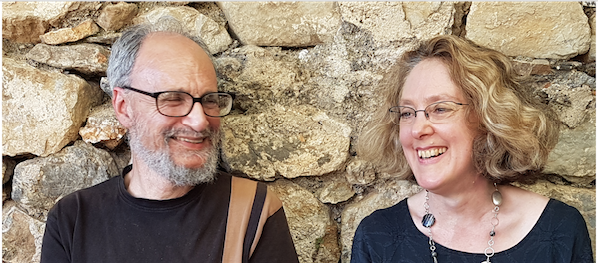 The authors during a visit by Daphne and Jeff Perry to Jan and Mark Adler to celebrate going to press (September 2017) | |
|
Mark Adler began helping in his father's legal practice as a copy typist and office boy during school holidays in the late 1950s and continued throughout his teens, gradually taking on more responsibilities. After an honours degree in philosophy from Warwick University, a post-graduate teaching certificate from Birmingham University, and a 2-month teaching career, he returned to the firm as a clerk in 1972 while he decided what to do next, and stayed on. In the days before compulsory attendance at law school he put himself through the Law Society's exams while working in the practice part-time, qualifying in 1979. He remained as assistant solicitor and took over the practice on his father's sudden death the following year. Lacking both the opportunity and the inclination to specialise, he took on private and commercial conveyancing, landlord-and-tenant work, family law, employment, wills, probate, and a wide range of civil litigation. Later he advised the Office for the Supervision of Solicitors on the merits of complaints and in minor cases conciliated between solicitors and their dissatisfied clients. He had always enjoyed writing and soon began simplifying his language, and when possible his procedures, joining the lawyers' campaigning group Clarity when John Walton founded it in 1983. He served on Clarity's committee from 1984 until 2010, chairing it for 9 years between 1989 and 2000 and editing the journal for 13 years. In the early days he horrified a more experienced solicitor by submitting a punctuated draft lease (and later reinstating all the red-deleted commas and full stops). His wills were drafted so that they could be understood by testators, beneficiaries, and lay executors. To replace the ritual conveyancing dance in which jargon-filled standard enquiries about the property being sold were submitted for the buyers and answered evasively for the sellers, he designed a more practical information questionnaire that the sellers could complete themselves and the buyers could understand — and an inventory of fixtures and contents making clear which were included in the sale. These forms and the revised procedure were adopted into the Law Society's conveyancing protocol. The plain language policy attracted many new clients, from lay people who wanted to understand their own documents to institutions, legislative drafters, and other lawyers, whose precedents he rewrote and for whom he gave seminars. The first edition of Clarity for Lawyers was published in 1990, and an expanded and revised version in 2006. He retired from practice in 2007 with an award for his work from PLAIN (Plain Language Association InterNational). Since then he has lived with his wife and various animals in the mountains of southern France. But he has continued his interest in legal language and the third edition of Clarity for Lawyers reflects the development of his ideas during this period. His website "http://www.mark-adler-law.uk" opens in a separate window, and he can be reached at markadler@orange.fr or inspected on his LinkedIn profile. |
Daphne Perry graduated in law from Cambridge University in the 1980s and has been a plain English enthusiast since 1993, when an expert witness introduced her to the international campaign group Clarity. For 12 years she practised (as Daphne Loebl) as a commercial barrister at Fountain Court Chambers in London, using plain English to become more persuasive. In 1997, Chambers Guide to the Legal Profession recommended her as one of the 10 runners-up to the top junior barrister for commercial work in London. For 12 years after that she was plain language co-ordinator at Dentons, a large international law firm based in London, writing, training, and supporting the fee-earners. She is now a freelance consultant, legal writer, and trainer on plain English for law and business. She also writes commercial contract law and drafting materials for Practical Law Commercial. She has served as Clarity's international secretary and for many years organised Clarity events in London. She remains Clarity's UK representative. She also enjoys walking, singing, gardening, and bell ringing. For more information about her experience and her consultancy, writing and training work see her LinkedIn page and ClarifyNow or contact her at daphne.perry@clarifynow.co.uk. Daphne talks to Eduardo Reyes, features editor of the Law Society Gazette, in this 8-minute vodcast: |